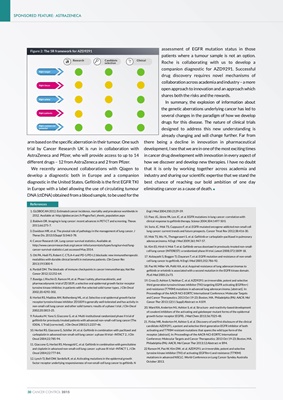
arm based on the specific aberration in their tumour. One such
trial by Cancer Research UK is run in collaboration with
AstraZeneca and Pfizer, who will provide access to up to 14
different drugs - 12 from AstraZeneca and 2 from Pfizer.
We recently announced collaborations with Qiagen to
develop a diagnostic both in Europe and a companion
diagnostic in the United States. Gefitinib is the first EGFR TKI
in Europe with a label allowing the use of circulating tumour
DNA (ctDNA) obtained from a blood sample, to be used for the
SPONSORED FEATURE: ASTRAZENECA
30 CANCER CONTROL 2015
assessment of EGFR mutation status in those
patients where a tumour sample is not an option.
Roche is collaborating with us to develop a
companion diagnostic for AZD9291. Successful
drug discovery requires novel mechanisms of
collaboration across academia and industry - a more
open approach to innovation and an approach which
shares both the risks and the rewards.
In summary, the explosion of information about
the genetic aberrations underlying cancer has led to
several changes in the paradigm of how we develop
drugs for this disease. The nature of clinical trials
designed to address this new understanding is
already changing and will change further. Far from
there being a decline in innovation in pharmaceutical
development, I see that we are in one of the most exciting times
in cancer drug development with innovation in every aspect of
how we discover and develop new therapies. I have no doubt
that it is only by working together across academia and
industry and sharing our scientific expertise that we stand the
best chance of reaching our bold ambition of one day
eliminating cancer as a cause of death. l
References
1. GLOBOCAN 2012. Estimated cancer incidence, mortality and prevalence worldwide in
2012. Available at: http://globocan.iarc.fr/pages/fact_sheets_population.aspx
2. Baldwin DR. Imaging in lung cancer: recent advances in PET-CT and screening. Thorax.
2011;66:275-7.
3. Davidson MR, et al. The pivotal role of pathology in the management of lung cancer. J
Thorac Dis. 2013;5(Suppl 5):S463-78.
4. Cancer Research UK. Lung cancer survival statistics. Available at:
http://www.cancerresearchuk.org/cancer-info/cancerstats/types/lung/survival/lungcancer-survival-statistics
Last accessed May 2014.
5. Ott PA, Hodi FS, Robert C. CTLA-4 and PD-1/PD-L1 blockade: new immunotherapeutic
modalities with durable clinical benefit in melanoma patients. Clin Cancer Res
2013;19:5300-9.
6. Pardoll DM. The blockade of immune checkpoints in cancer immunotherapy. Nat Rev
Cancer 2012;12:252-64.
7. Baselga J, Rischin D, Ranson M, et al. Phase I safety, pharmacokinetic, and
pharmacodynamic trial of ZD1839, a selective oral epidermal growth factor receptor
tyrosine kinase inhibitor, in patients with five selected solid tumor types. J Clin Oncol
2002;20:4292-302.
8. Herbst RS, Maddox AM, Rothenberg ML, et al. Selective oral epidermal growth factor
receptor tyrosine kinase inhibitor ZD1839 is generally well-tolerated and has activity in
non-small-cell lung cancer and other solid tumors: results of a phase I trial. J Clin Oncol
2002;20:3815-25.
9. Fukuoka M, Yano S, Giaccone G, et al. Multi-institutional randomized phase II trial of
gefitinib for previously treated patients with advanced non-small-cell lung cancer (The
IDEAL 1 Trial) [corrected]. J Clin Oncol 2003;21:2237-46.
10. Herbst RS, Giaccone G, Schiller JH, et al. Gefitinib in combination with paclitaxel and
carboplatin in advanced non-small-cell lung cancer: a phase III trial--INTACT 2. J Clin
Oncol 2004;22:785-94.
11. Giaccone G, Herbst RS, Manegold C, et al. Gefitinib in combination with gemcitabine
and cisplatin in advanced non-small-cell lung cancer: a phase III trial--INTACT 1. J Clin
Oncol 2004;22:777-84.
12. Lynch TJ, Bell DW, Sordella R, et al. Activating mutations in the epidermal growth
factor receptor underlying responsiveness of non-small-cell lung cancer to gefitinib. N
Engl J Med 2004;350:2129-39.
13. Paez JG, Jänne PA, Lee JC, et al. EGFR mutations in lung cancer: correlation with
clinical response to gefitinib therapy. Science 2004;304:1497-500.
14. Soria JC, Mok TS, Cappuzzo F, et al. EGFR-mutated oncogene-addicted non-small cell
lung cancer: current trends and future prospects. Cancer Treat Rev 2012;38:416-30.
15. Mok TS, Wu YL, Thongprasert S, et al. Gefitinib or carboplatin-paclitaxel in pulmonary
adenocarcinoma. N Engl J Med 2009;361:947-57.
16. Kim ES, Hirsh V, Mok T, et al. Gefitinib versus docetaxel in previously treated non-smallcell
lung cancer (INTEREST): a randomised phase III trial. Lancet 2008;372:1809-18.
17. Kobayashi S, Boggon TJ, Dayaram T, et al. EGFR mutation and resistance of non-smallcell
lung cancer to gefitinib. N Engl J Med 2005;352:786-92.
18. Pao W, Miller VA, Politi KA, et al. Acquired resistance of lung adenocarcinomas to
gefitinib or erlotinib is associated with a second mutation in the EGFR kinase domain.
PLoS Med 2005;2:e73.
19. Cross D, Ashton S, Nebhan C, et al. AZD9291: an irreversible, potent and selective
third generation tyrosine kinase inhibitor (TKI) targeting EGFR activating (EGFRm+)
and resistance (T790M) mutations in advanced lung adenocarcinoma. [abstract]. In:
Proceedings of the AACR-NCI-EORTC International Conference: Molecular Targets
and Cancer Therapeutics; 2013 Oct 19-23; Boston, MA. Philadelphia (PA): AACR; Mol
Cancer Ther 2013;12(11 Suppl):Abstract nr A109.
20. Ward RA, Anderton MJ, Ashton S, et al. Structure- and reactivity-based development
of covalent inhibitors of the activating and gatekeeper mutant forms of the epidermal
growth factor receptor (EGFR). J Med Chem 2013;56:7025-48.
21. Finlay MR, Anderton M, Ashton S, et al. Discovery of and first disclosure of the clinical
candidate AZD9291, a potent and selective third-generation EGFR inhibitor of both
activating and T790M resistant mutations that spares the wild type form of the
receptor. [abstract]. In: Proceedings of the AACR-NCI-EORTC International
Conference: Molecular Targets and Cancer Therapeutics; 2013 Oct 19-23; Boston, MA.
Philadelphia (PA): AACR; Mol Cancer Ther 2013;12:Abstract nr B94.
22 Ranson M, Pao W, Kim DW, et al. AZD9291: an irreversible, potent and selective
tyrosine kinase inhibitor (TKI) of activating (EGFRm+) and resistance (T790M)
mutations in advanced NSCLC. World Conference on Lung Cancer Syndey Australia
October 2013.
Right target
Right tissue
Right safety
Right patients
Right commercial
potential
Research Candidate Clinical
selection
Figure 2: The 5R framework for AZD9291